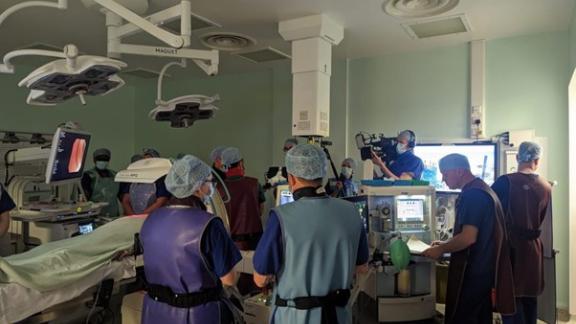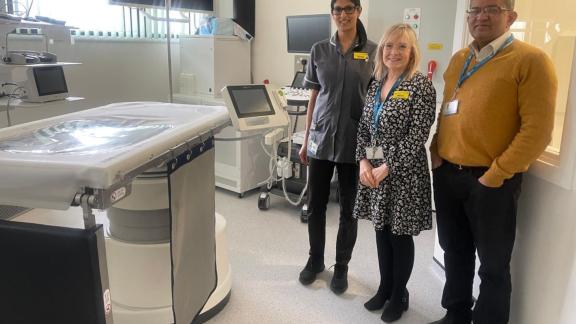Innovation through robotic-assisted operations to address health inequities

Overview
The Black Country Provider Collaborative, made up of four Black Country NHS trusts, has procured innovative robotic-assisted capabilities across each of the trusts to enhance the access to high-quality care and improve patient outcomes in a bid to address the health inequities in the region.
What the organisation faced
The Black Country Provider Collaborative (BCPC) is an agreement between acute providers to work together to deliver effective, accessible, and sustainable acute care across the Black Country region. This includes joint working in clinical and non-clinical areas such as workforce, finance, surgical and non-surgical specialities. The trusts working in partnership are:
- Sandwell and West Birmingham NHS Trust
- The Dudley Group NHS Foundation Trust
- The Royal Wolverhampton NHS Trust
- Walsall Healthcare NHS Trust
The provider collaborative seeks to proactively look for opportunities for working at scale and progress key developments on behalf of its partner organisations to enable to delivery of better patient care.
Among the key objectives of the collaborative is to optimise clinical outcomes across acute services in the region and address inequalities in access and outcomes within the local population. The Black Country is the second most challenged healthcare system in the country in terms of health inequities, and the collaborative have been looking for innovative ways to address them.
Sir David Nicholson KCB CBE, who became joint chair of Walsall and Wolverhampton trusts from the beginning of April 2023 year alongside responsibilities at Sandwell and Dudley trusts, has looked to digital and technological advancement to redress health inequalities.
Improvement
A recent system development has been the pursuit of a business case to procure additional surgical robots to bolster robotic assisted surgery (RAS) across the Black Country. This was part of a drive towards clinical transformation to further improve services and give access to high-quality care to patients in the region.
The Royal Wolverhampton NHS Trust (RWT) has led the way in terms of robotics in the area, with surgeons at the trust performing robotic surgery in urology dating back to 2010. Following the successes at RWT, the programme agreed that a robotics strategy should be developed to expand the use of these services to other parts of the region.
Previously, the pathway for patients requiring renal surgery started as a collaboration between Dudley and Wolverhampton, where all robotic renal surgery took place at Wolverhampton’s New Cross Hospital site, while laparoscopic surgery takes place at Dudley’s Russell Hall Hospital. There has now been an expansion in the collaborative’s robotic capabilities, with the Russell Hall Hospital now also hosting robotic procedures and the kidney removal procedure taking place in March 2023.
Equally, the first robotic-assisted operation was performed at Sandwell and West Birmingham NHS Trust’s City Hospital on 14 April, and earlier this year in January, Walsall Manor Hospital became the first district general hospital in the country to offer robot-arm-assisted surgery for hip and knee replacement patients.
Outcomes
Surgical robotics is growing across the midlands region, with all ICSs having surgical robots in their patch. The Black Country has the second largest, with five and across the midlands region there are now 28 robots in place.
Since the Black Country implemented its first surgical robot ten years ago, there has been a year-on-year increase in the activity undertaken in addition to an increase in the breadth of specialties available.
This expansion of robotic surgery has offered many benefits to patients across the Black Country area. Although the operations sometimes take longer than open procedures, robotic-assisted surgery provides increased precision and greater accuracy.
This has multiple benefits to patients including shorter recovery times; reduced bleeding, risk of infection and surgical complications; less post-operative pain; smaller scars and reduced length of stay for patients in hospital. In 2022 the Black Country ICS had the shortest hospital stay in the country for prostatectomy and cystectomy simultaneously, reflecting its early adoption of RAS and committed development of a specialist high-volume surgical team.
These technological advancements have raised the standards across the collaborative, giving patients greater access to the best possible care across the Black Country and helping to reduce health inequities across the region.
Further information
For more detail on this improvement insight, please contact blackcountry.pc@nhs.net



